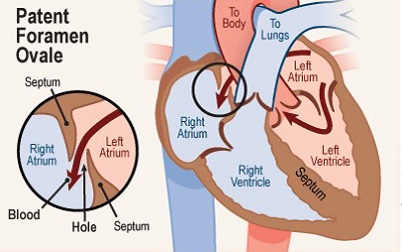Nikhil Prasad Fact checked by:Thailand Medical News Team Jun 08, 2024 1 year, 7 months, 3 weeks, 4 days, 23 hours, 14 minutes ago
Cardiology Updates: Every fourth person you know likely has a small hole in their heart. This isn't a metaphor but a real condition known as a patent foramen ovale (PFO). While it sounds alarming, many people live their entire lives without knowing they have it. However, this seemingly innocent hole can pose serious health risks, including strokes, heart attacks, and other embolic events. Dr Bernhard Meier, a leading cardiologist from the University of Bern - Switzerland, argues that every PFO should be closed to prevent potential health hazards.
 Patent Foramen Ovale - A Hidden Threat in Our Hearts
What is a PFO?
Patent Foramen Ovale - A Hidden Threat in Our Hearts
What is a PFO?
Everyone before birth has a hole between the left and right atria (upper chambers) of the heart. This hole most often closes shortly after birth. PFO is what the hole is called when it fails to close naturally after a baby is born. This hole exists in roughly 25% of the population. For most, it causes no problems. However, in about 5% of people, the PFO can lead to serious health issues.
When a PFO is dangerous, it allows blood clots to pass from the right side of the heart to the left, potentially causing strokes, heart attacks, or other embolic events. This can happen without warning, making it a silent but potentially deadly condition.
The Case for Closure
Dr Meier's review covered in this
Cardiology Updates report, emphasizes the importance of closing PFOs, especially for those with high-risk features. Closing a PFO is a straightforward procedure with significant benefits. It's often compared to a "mechanical vaccination" because it can prevent severe health problems down the line.
The Procedure: Simple and Safe
Duration: The procedure takes less than 30 minutes.
Recovery: Patients can leave the hospital on the same day and resume normal activities almost immediately.
Aftercare: A short course of aspirin is typically all that is needed post-procedure.
This minimally invasive procedure involves inserting a small device through a vein in the leg, which then travels to the heart and seals the hole. The success rate is virtually 100%, with minimal complications.
When to Screen for a PFO
Screening for PFOs should become more common, particularly in individuals at higher risk of embolic events. These include:
-Young people with migraines: Migraines, especially with aura, can sometimes be linked to PFOs. Closing the PFO often reduces migraine symptoms and provides the added benefit of preventing future embolic events.
-Patients with unexplained strokes or heart attacks: For those who suffer these conditions without an obvious cause, a PFO might be the hidden culprit.
/>
-People with a family history of PFO-related problems: If a close relative has experienced serious issues due to a PFO, screening is advisable.
The Broader Benefits of PFO Closure
Closing a PFO doesn't just prevent life-threatening events; it can also improve quality of life in other ways:
-Migraine Relief: Many patients report significant reductions in migraine frequency and severity post-procedure.
-Improved Exercise Tolerance: Some people experience better stamina and less breathlessness during physical activities.
-Reduction in Embolic Events: Closing a PFO lowers the risk of strokes, heart attacks, and other embolic events.
Why Isn't Everyone Screened?
Despite the clear benefits, widespread screening for PFOs isn't yet a standard practice. This is partly due to the sheer number of people who have PFOs - around 25% of the population. However, focusing on high-risk groups can make screening more manageable and cost-effective.
Personal Stories: The Human Impact
Consider the case of a 39-year-old nurse who suffered from debilitating migraines for decades. It wasn't until she experienced a stroke that her PFO was discovered and closed. Post-procedure, her migraines vanished, but the delay in diagnosis left her with permanent speech difficulties. Had her PFO been discovered and treated earlier, she could have avoided the stroke and the subsequent challenges.
Conclusion: A Call to Action
The evidence is compelling: closing PFOs can save lives and improve quality of life for many. Dr Meier's review highlights the simplicity and effectiveness of the procedure, urging the medical community to take PFOs seriously. By increasing awareness and screening, especially in high-risk groups, we can prevent countless strokes, heart attacks, and other serious health issues.
In essence, closing the gap-literally and figuratively - can make a world of difference. It's time for the medical community to embrace this preventive measure and protect more people from the hidden dangers of a patent foramen ovale.
The study review was published in the peer reviewed Journal of Clinical Medicine.
https://www.mdpi.com/2077-0383/13/11/3355
For the latest Cardiology Updates, keep on logging to Thailand Medical News.
Read Also:
https://www.thailandmedical.news/news/glycine-the-heart-protector-we-didn-t-know-we-needed
https://www.thailandmedical.news/news/herbs-and-phytochemicals-ilex-pubescens-protects-heart-after-myocardial-infarction
https://www.thailandmedical.news/news/gut-health-and-immune-inflammation-new-insights-into-heart-failure
